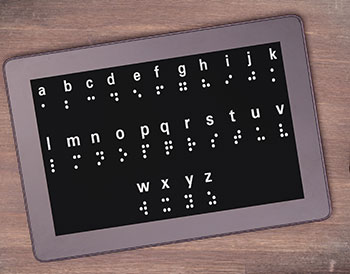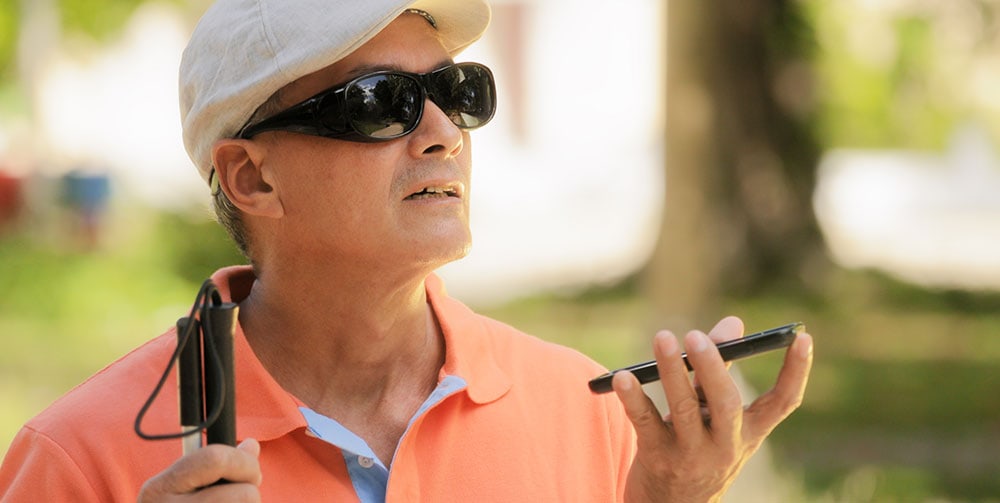Speech-to-Text Devices for Low Vision: Narrowing the Communication Gap
Speech-to-Text Devices for Low Vision: Narrowing the Communication Gap
Blog Article
Empowering Independence With Assistive Modern Technology for the Blind
The combination of assistive modern technology into the lives of individuals with visual disabilities represents a substantial improvement in promoting independence and self-sufficiency. From ingenious display visitors to advanced clever walking sticks, these devices not just boost daily navigating and interaction however additionally empower users to involve meaningfully in numerous elements of life. As we explore the myriad benefits and real-world applications of these innovations, it ends up being crucial to check out the hidden aspects that contribute to their effectiveness and the capacity for future developments in this important field.
Overview of Assistive Modern Technology

The development of assistive innovation is grounded in principles of inclusivity and empowerment. Developments in software application, hardware, and sensory enhancements supply customers with choices customized to their specific requirements. From screen visitors that convert text to speech, to responsive tools that share info via touch, these devices transform the way people involve with their environments.
Along with useful applications, assistive innovation fosters better social addition and involvement in numerous industries, including education and learning and employment (AI-powered visual aids). As r & d continue to advance, the capacity for assistive innovation to further improve the lives of visually impaired people continues to be encouraging, leading the way for a much more equitable society where everybody can grow
Kinds Of Assistive Tools
A range of assistive gadgets have actually arised to support people with aesthetic impairments, each designed to meet details demands and boost daily performance. These gadgets range from low-tech options to modern technologies, offering varied choices for users.
Low-tech devices consist of magnifiers and large-print materials that aid in analysis and writing. Braille tools, such as Braille stylus pens and slates, make it possible for tactile reading and communication. Orientation and flexibility help, like white walking canes, assist customers browse their atmosphere safely.
On the greater end of the spectrum, electronic zoom systems and screen viewers supply substantial support. Digital magnifiers allow individuals to expand message and pictures on screens, while screen visitors convert electronic web content right into synthesized speech, facilitating accessibility to info on smartphones and computers.
Mobile phone applications likewise play an important duty, giving features like message recognition and navigation aid. Wearable modern technology, such as smart glasses equipped with enhanced fact, is emerging as an encouraging tool to enhance situational awareness.
Advantages of Assistive Innovation
The assimilation of assistive technology substantially improves the lifestyle for people with aesthetic disabilities. These innovations empower customers by advertising freedom, allowing them to browse their atmospheres better and do day-to-day jobs with better convenience. trendy glasses for men For example, display readers and Home Page zoom software enable individuals to accessibility digital info, cultivating instructional and professional possibilities that might have previously been out of reach.
In addition, assistive tools such as clever walking sticks and GPS applications provide real-time navigating support, boosting wheelchair and safety and security. This raised freedom not just enhances self-worth but also urges social engagement, enabling individuals to participate more completely in their communities.
Assistive innovation also promotes interaction, assisting users attach with others through voice recognition and text-to-speech applications. This capacity is vital for maintaining connections and accessing essential info.
In addition, the modification choices available with many assistive technologies guarantee that users can customize tools to their details requirements, better improving use and effectiveness. In general, the benefits of assistive technology for individuals with visual impairments are profound, promoting a more comprehensive society where everyone can seek their goals and goals.
Case Studies and Success Stories
Highlighting the transformative effect of assistive modern technology, numerous study illustrate exactly how people with visual disabilities have successfully integrated these devices into their everyday lives. One engaging instance entails an university pupil that used display reading software application to navigate scholastic products and online sources effectively. This innovation not only promoted her education yet likewise improved her self-confidence in getting involved in conversations and group tasks.
Another study features a specialist who employs a mobile phone application developed for navigating and things recognition. By using this application, he has gained back autonomy in both his individual and workplace, permitting him to commute individually and engage with colleagues more properly.
In addition, a senior citizen shared her experience with braille e-readers, which enabled her to access a substantial selection of literary works and remain linked with her community with publication clubs.
These success stories underscore the essential role of assistive modern technology in cultivating self-reliance, improving high quality of life, and advertising social combination for people with visual impairments (Braille displays and notetakers). By embracing these cutting-edge devices, users can get rid of difficulties and take possibilities that add to their individual and professional satisfaction

Future Trends in Assistive Technology
Development in assistive technology is positioned to redefine the landscape of support for individuals with visual impairments. Arising fads stress the assimilation of artificial intelligence (AI) and machine understanding, which boost the performance of tools that assist with navigating and information accessibility. AI-driven applications are currently qualified of analyzing aesthetic information in real-time, directory allowing users to involve with their atmosphere more independently.
Furthermore, the development of wearable modern technology is progressing quickly. Smart glasses equipped with augmented truth (AR) can provide audio descriptions of surroundings, transforming just how users connect with public rooms. These tools not just advertise freedom yet additionally foster social incorporation.
In Addition, the Net of Things (IoT) is making homes smarter, enabling seamless connection in between assistive gadgets and everyday devices. This connectivity encourages customers by allowing voice-activated controls and automated responses tailored to private requirements.
Conclusion
To conclude, assistive innovation plays a pivotal function in encouraging people with visual problems by improving their self-reliance and involvement with their environments. The diverse variety of tools and applications readily available not just promotes navigating and communication yet also promotes social integration and chances for specialist and personal development. As developments proceed in this field, the possibility for boosting the lifestyle for those with aesthetic impairments will broaden, fostering greater autonomy and empowerment.

Report this page